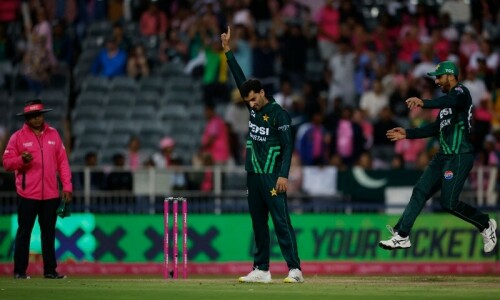Xi Jinping meets Modi, eyes 'new chapter' in China-India ties

President Xi Jinping sought to open a “new chapter” in relations between China and India as he hosted Prime Minister Narendra Modi on Friday for a summit aimed at mending ties strained by a border dispute.
Xi greeted Modi at a Hubei province museum in the city of Wuhan for what has been billed as an “informal” meeting that will continue on Saturday.
While last year's high-altitude standoff in the Himalayas has been resolved, the world's most populous countries have a long history of mistrust.
New Delhi has also raised concerns about Beijing's Belt and Road initiative, a global trade infrastructure programme that includes a major project through Pakistan-administered Kashmir, the disputed territory that New Delhi claims is illegally occupied.
Friday's meeting included the museum tour, a meeting and dinner. On Saturday, they will walk along the East Lake, ride a boat and have lunch together, according to the Indian leader's official agenda.
“I hope that the prime minister and I can open a new chapter in Sino-Indian relations during this meeting,” Xi said, according to state broadcaster CCTV.
The Chinese leader said the two sides have established a good working relationship and Beijing was willing to build a closer partnership and cooperation in all fields.
“I want to make our countries' friendly relations ceaselessly grow stronger, to make them rush forward without pause like the Yangtze and Yellow Rivers, eternally moving forward,” Xi said.
Modi thanked Xi for meeting him twice outside Beijing, telling the Chinese leader: “This in itself shows love and affection towards India.” With 40 percent of the world's population, India and China have a responsibility to fix the world's many problems, Modi said, adding that the meeting was a “great opportunity” to do so.
Invoking Xi's political slogan and his own, Modi said: “Together your 'new era' dream and our 'new India' effort will be the right step for the benefit of the world.” But neither leader directly mentioned the border row or other sources of tension in their remarks.
Disputed border
The summit “is New Delhi's well-intentioned attempt to reach out to Beijing to see if the past can be put behind and if the relationship can be reset,” Harsh Pant, a professor of international relations at King's College in London, told AFP.
Both nations say they are committed to solving long-standing border disagreements through dialogue, but progress has been glacial.
India and China went to war in 1962 over Arunachal Pradesh, with Chinese troops temporarily capturing part of the Himalayan territory.
The dispute remains unresolved: India considers Arunachal Pradesh one of its northeastern states, while China stakes claim to about 90,000 square kilometres of the area.
In February, Beijing lodged an angry protest with New Delhi over a trip by Modi to the state.
Last year, Indian and Chinese troops faced off on the Doklam plateau, an area high in the Himalayas claimed both by China and by India's ally Bhutan.
The dispute began in June when Chinese troops started building a road on the plateau and India deployed troops to stop the project.
A crisis was averted in August when the two nuclear-armed nations pulled back.
“We have to step out of the shadows of the 1962 war,” said Wang Dehua, a South and Central Asia expert at the Shanghai Academy of Social Sciences.
“The meeting will focus on avoiding the unhappy events we saw in Doklam last year,” Wang said.
Modi is expected to return to China in June for the summit of the Shanghai Cooperation Organisation, a security bloc led by Beijing and Moscow.
Indian analysts point to a pragmatic reason for Modi to want better relations with China: he faces national elections next year, and he would be better off with stable ties with the world's second-largest economy.
“I don't think he would like to go into an election with the kind of relationship, the low point it had reached over the last year,” Pant said.
With China facing a potential tariff war with the United States, Beijing and New Delhi could find common ground on international trade, Pant added.
“It is one of the issues where India and China have worked together on the global stage in the past,” he said.














































